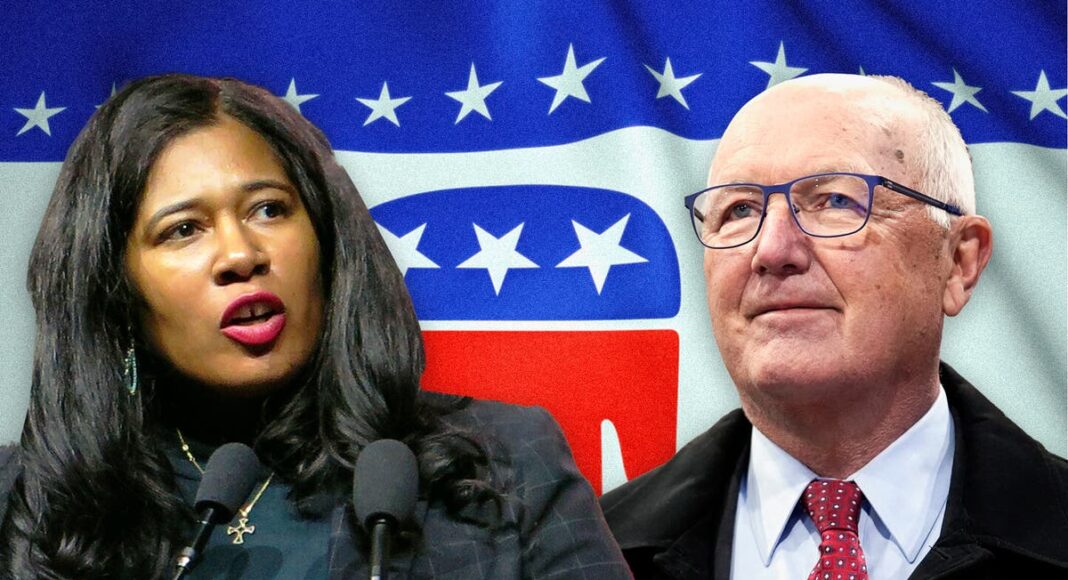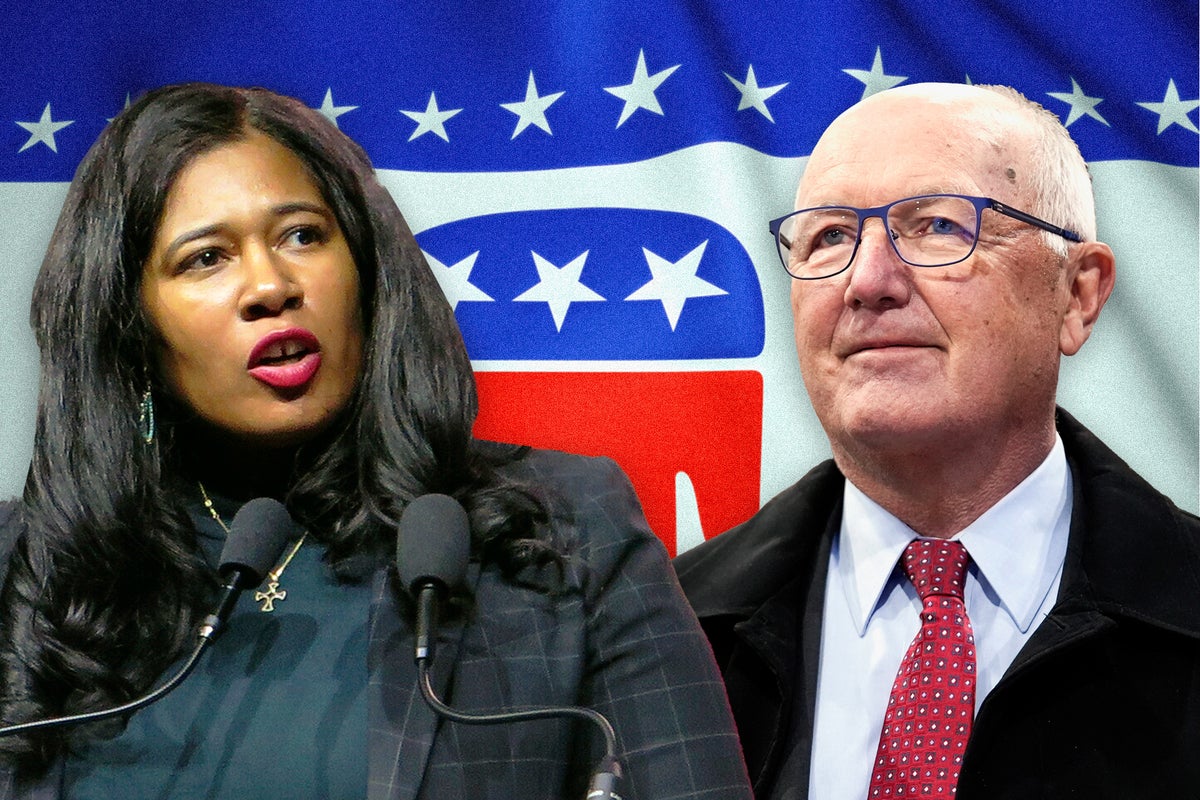Sign up for the daily Inside Washington email for exclusive US coverage and analysis sent to your inboxGet our free Inside Washington email
Michigan residents will on Tuesday help decide whether Donald Trump or Nikki Haley will represent the Republican Party in this year’s presidential election.
After the public has its say, local Republican officials will meet at a party convention on Saturday 2 March to add their own votes in a two-stage primary process.
But this year, there will be not one but two duelling conventions, convened by two rival party leaders – both of whom claim they are the real one.
Such is the chaos that has engulfed the Great Lake State’s GOP since its disastrous showing in the 2022 midterm elections, which saw Democrats take both houses of the state legislature and the governor’s seat for the first time in decades.
In one corner is Kristina Karamo, the first Black chairperson in the state party’s history, who insists that she is still the rightful leader of the organisation and retains control of its finances, website, and official social media.
In the other is Pete Hoekstra, a former US ambassador to the Netherlands under Donald Trump, who was elected to replace Karamo in a closed vote last month and has been accepted by the national Republican Party as the one true chairman.
That vote, which is now the subject of a lawsuit between Ms Karamo’s camp and Mr Hoekstra’s, was the culmination of months of infighting that at times grew so vicious that it broke out into physical brawling.
All of which could have serious consequences for the general election this November, in a state that swung for Donald Trump in the 2016 presidential election and was retaken by Joe Biden by a margin of only 154,188 voters in 2020.
“We can’t afford to lose Michigan,” Bree Moeggenberg, a member of the Michigan state GOP’s executive committee who led the push to remove Ms Karamo, tells The Independent.
“Michigan can literally make or break the election, and in our current political state, we are blue. Our secretary of state, our attorney general, our governor, are all Democrats.”
‘The brink of bankruptcy’
“Chaos”. A “disaster”. An “epic failure”. A “tyrannical, incompetent dumpster fire”.
These are just a few of the words used by party officials to describe Kristina Karamo’s time as chairwoman of the Michigan GOP.
When Ms Karamo was first elected in February 2023, her biggest task was to rebuild the party’s finances after an exodus of traditional big-money donors.
“Michigan is home to a significant, longstanding moderate Republican tradition,” Jenna Bednar, a political scientist at the University of Michigan, tells The Independent. “This portion of the Republican party has been feeling squeezed out by the increasingly extremist wing.
“That dissatisfaction came to a head in the 2022 election… moderate Republicans did not contribute to the campaign coffers.”
This dynamic, Ms Bednar adds, exacerbated a more fundamental problem: the end of partisan gerrymandering that had previously given an advantage to Republicans, despite the state’s broadly 50-50 political makeup.
Ms Karamo was always going to struggle to win back those moderates. Her first claim to fame was alleging that she had personally witnessed widespread fraud in Detroit while serving as a poll watcher in the 2020 election.
She refused to concede her own loss in the race to be Michigan’s secretary of state in 2022, described the January 6 riot as a false flag attack by Antifa activists, and once claimed that yoga is a “Satanic ritual” designed to “summon a demon”.
But her plan was to end the state GOP’s reliance on big donors such as Ron Wieser and the DeVos family. Instead, she promised to raise tens of millions of dollars from a larger number of smaller donors drawn from the party’s rank and file.
Bree Moeggenberg was all in favour of that. The 44-year-old mother of three, who runs a childcare business, was part of a new post-Trump generation of Republican politicians who advocated greater grassroots control of the party.
“I voted for Karamo in all three rounds. And way back in the summer, when we had concerns, it was never to oust her; it was always to try to work with her,” she says.
Instead, Ms Moeggenberg alleges, Ms Karamo spent her energy on squashing dissent, attacking other Republicans, and expelling them from their positions, centralising power under herself while further alienating the party’s existing donors.
At one point, a leaked spreadsheet began circulating among party members that ranked potential conference volunteers on a four-point loyalty scale, with number one being “patriot” and number four being “Me First or RINO” – ie, “Republican In Name Only”. Ms Karamo said she had nothing to do with the spreadsheet and attributed it to a “temporary volunteer”.
Meanwhile, the party’s financial position continued to decline. In July, the party reportedly had less than $150,000 left in its financial reserve. In November, she began trying to sell the party’s historic headquarters near the Michigan Capitol, claiming that the maintenance costs were unaffordable.
By December, a report commissioned by former party district chair and sometime Karamo ally Warren Carpenter warned that the party was on the “brink of bankruptcy”. It accused Karamo of increasing the party’s debt from just under $460,000 to at least $619,000, and of transparency failures so dire they might have broken campaign finance laws.
Finally, in January, Ms Moeggenberg and her allies managed to collect enough signatures to hold a vote on Ms Karamo’s leadership. Though many Karamo loyalists boycotted the meeting, those in attendance appointed proxies to represent absent colleagues – a power granted to them by the party bylaws – which allowed them to achieve a quorum and elect Pete Hoekstra in Ms Karamo’s stead.
Ms Karamo continues to insist that the vote was not legitimate and is now fighting a lawsuit to retain control of the party. While Pete Hoekstra holds a presidential nomination convention in Grand Rapids, she has announced a rival convention on the same day in Detroit, at the opposite end of Michigan.
Some commentators have jokingly compared the situation to the 14th-century Avignon Papacy, in which the Catholic Church was split between two rival popes for nearly seven decades.
Ms Karamo did not respond to a request for an interview.
‘We are not in a position to lose any voters’
Realistically, the Republican National Committee’s (RNC) endorsement of Mr Hoekstra leaves little doubt as to which party convention will carry more weight. But the ongoing turmoil has sharp implications for Michigan’s political future, and for the nation.
“Our politics, top to bottom.. continues to attract cartoon characters attracted to the extreme, so it shouldn’t be a surprise any of this has happened,” Doug Heye, a veteran Republican operative and former PR chief for the RNC, tells The Independent.
“More and more, we’ve seen state [Republican] parties try to morph themselves into ‘who can be the Trumpiest person out there’… trying to decide who the good Republicans and the bad Republicans are.”
He describes the chaos in Michigan as symptomatic of Donald Trump’s “radicalising” effect on American politics, turning local parties into personality cults ill-equipped to win over moderate voters or work together in unison.
Indeed, in this squabble, both pope and antipope appear broadly aligned in terms of ideology. Mr Hoekstra has received the former president’s enthusiastic endorsement, and Heye even remembers Mr Hoekstra “giving [him] grief” in 2016 for not backing Trump.
Ms Moeggenberg, meanwhile, is a staunch Trump supporter and a former chapter leader of Moms for Liberty, a socially conservative lobby group that has pushed to remove LGBT+ books from school libraries. “I am a very, very hardworking Republican, and I have dedicated hours upon hours to being exactly that,” she says.
She rejects the idea that Republicans brought this situation on themselves by embracing Trump’s brand of totalising politics. Trump, she says, rightly went after “Democrats that had infiltrated our party”, whereas Ms Karamo has attacked even unimpeachable conservatives who happened to disagree with her personally.
Still, believes the Republicans cannot win Michigan without some degree of unity between different political camps, and is deeply concerned about 2024.
“We are not in a position to lose any voters,” she says. “We need to be opening our arms, and acting like a party of liberty, and welcoming those Republicans that don’t fully agree with us,” she says. “It is impossible to gain voters while you are kicking voters away – when you’re telling donors you don’t want their money.”
Ironically, Mr Heye believes that anger at Joe Biden’s policy towards Israel and Palestine among Michigan’s large Arab-American population could end up costing him the state, even if the GOP remains a shambles.
Nevertheless, he argues, continuing disunity could depress Republican turnout – not only due to bad PR but by kneecapping the logistics of day-to-day campaigning.
“[State parties] are on the ground,” says Mr Heye. “They organise, county by county, precinct by precinct, to find their voters, to target them – with mail, with knocking on doors, with phone calls… that is funded in large part by the national parties, but it’s done in states and counties.”




